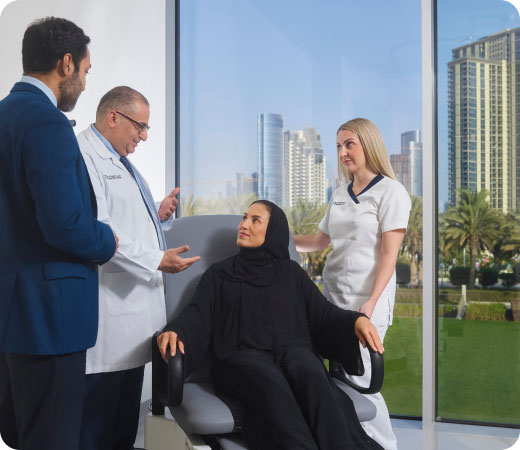
The Lymphoma Program at Cleveland Clinic Abu Dhabi provides specialized care and support for people diagnosed with lymphoma, close to home. Lymphoma is a cancer of the lymphatic system, which includes the lymph nodes, spleen, thymus gland, and bone marrow. Our team is experienced in diagnosing and treating a range of lymphomas, including non-Hodgkin lymphoma, Hodgkin lymphoma, and others.
Today, the prognosis for lymphoma patients is generally very good. Our skilled, multidisciplinary Lymphoma Program team supports the care of both outpatients and inpatients at Cleveland Clinic Abu Dhabi, tailoring treatments specifically to each individual based on their needs.

The Lymphoma Program offers every patient a dedicated team of medical experts to support them, and their family, throughout their cancer journey. The multidisciplinary team meets daily to discuss each patient’s needs, their progress and to decide the best, most patient-friendly treatment plan.

Lymphoma is cancer of the lymphatic system, which is a part of the body’s immune system, and includes the lymph nodes, thymus gland, spleen, and bone marrow. The main types of lymphoma are called Hodgkin lymphoma and non-Hodgkin lymphoma.
Hodgkin Lymphoma: A cancer that affects the lymphatic system, which is part of the body’s immune system, and is one of the most curable forms of cancer.
Non-Hodgkin Lymphoma: Is not one disease but rather a diverse group of blood cancers originating in the lymphocytes. The disease can develop in one or multiple sites in the body and can either be slow or fast-growing depending on the sub-type.
Types of lymphoma that we treat include:

Symptoms of lymphoma may include:
Doctors don’t really know what causes lymphoma, but it happens when a white blood cell called a lymphocyte (which usually fights infection) develops a genetic mutation. This causes the cell to multiply rapidly and allows it to go on living when normal cells would usually die, leading to many diseased and ineffective lymphocytes in the lymph nodes and causing them, the spleen and liver to swell.
Things that can increase your risk of lymphoma include:

Diagnosing lymphoma can involve a number of tests and procedures, including:
Imaging scans, including:
After a diagnosis has been confirmed, the team will decide on the most effective treatment plan, based on several factors including the type of lymphoma you have, the stage of the lymphoma and your overall health. Treatment may include:

Researchers are still unsure how to prevent lymphoma. Most people with the disease have no preventable risk factors, meaning there is no way to prevent the disease.
However, being aware of the symptoms may be helpful. Following a healthy lifestyle, eating a balanced diet and taking regular exercise can reduce your chances of developing many types of cancer.

Our Lymphoma Program doctors have extensive expertise in the field of lymphoma and are board certified medical oncology specialties. The team provides excellent, Patients First medical care based on current United States and international guidelines. Caregivers involved in patient care for this program include:

Speak with our Contact Center for assistance
Request an Appointment 800 8 2223 International Patients